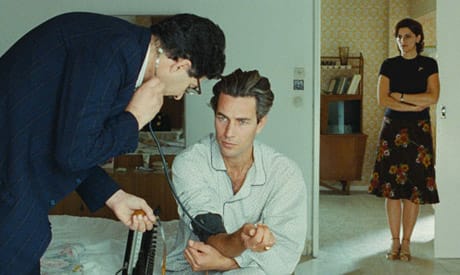For those familiar with the works of Elia Suleiman, The Time that Remains is the third instalment in his Palestinian identity exploration trilogy, which includes Divine Intervention and Chronicle of a Disappearance.
Inspired by the diaries of the writer/director's father, this film provides a strange and satirical outsider perspective to the conflict between Arabs and Jews that we're all too familiar with. Fortunately, this wry sense of humour and a lack of overbearing political polemics keep everything digestible, broadening the audience beyond those personally invested in the topic.
Using a somewhat awkward framing device of Suleiman riding in a taxi from the airport after arriving in Israel, The Time That Remains delivers a series of vignettes running from the late '40s to the present, making observations about key moments in a family's history while struggling with their place as Israeli-Arabs.
The initial tableau finds the mayor of Nazareth surrendering to the Israeli army when an Arab stronghold falls in 1948. Of course, Fuad Suleiman (Saleh Bakri) resists the changes, as his family moves abroad, eventually suffering brutality. The film then shifts decades later to Fuad's son Elia (the director, played by Zuhair Abu Hanna, as a child) being scolded in school for remarks made about the U.S. Inevitably, the later sequences detail an aging Elia suffering further injustices, eventually leaving the country, only to return in the final leg, giving the film its dramatic heft.
Aside from some techniques that occasionally prove a little too heavy-handed and some obnoxious secondary characters, this Palestinian comedy proves quite affecting and engaging. Much of this success comes from a unique visual style, wherein scenes are shot with an angularity and theatrical specificity that heighten the exaggerative elements.
Even viewers unconvinced by the narrative should find appeal in its overall aesthetics.
(E1)Inspired by the diaries of the writer/director's father, this film provides a strange and satirical outsider perspective to the conflict between Arabs and Jews that we're all too familiar with. Fortunately, this wry sense of humour and a lack of overbearing political polemics keep everything digestible, broadening the audience beyond those personally invested in the topic.
Using a somewhat awkward framing device of Suleiman riding in a taxi from the airport after arriving in Israel, The Time That Remains delivers a series of vignettes running from the late '40s to the present, making observations about key moments in a family's history while struggling with their place as Israeli-Arabs.
The initial tableau finds the mayor of Nazareth surrendering to the Israeli army when an Arab stronghold falls in 1948. Of course, Fuad Suleiman (Saleh Bakri) resists the changes, as his family moves abroad, eventually suffering brutality. The film then shifts decades later to Fuad's son Elia (the director, played by Zuhair Abu Hanna, as a child) being scolded in school for remarks made about the U.S. Inevitably, the later sequences detail an aging Elia suffering further injustices, eventually leaving the country, only to return in the final leg, giving the film its dramatic heft.
Aside from some techniques that occasionally prove a little too heavy-handed and some obnoxious secondary characters, this Palestinian comedy proves quite affecting and engaging. Much of this success comes from a unique visual style, wherein scenes are shot with an angularity and theatrical specificity that heighten the exaggerative elements.
Even viewers unconvinced by the narrative should find appeal in its overall aesthetics.
